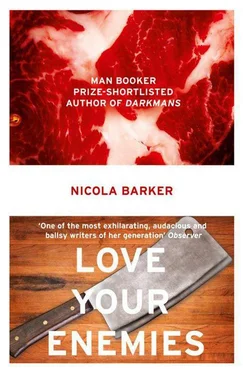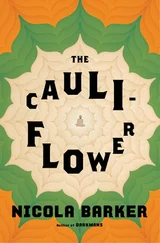He smiled back. ‘I’ll make some tea.’
As he pottered around at the rear of the shop, filling the kettle from their tiny sink and plugging it into the wall, she said, ‘I made a decision while you were gone, by the way.’
Steve frowned. ‘What sort of decision?’
She squatted next to him as he put a couple of tea bags into mugs which were balanced on the tray with the kettle, and said, ‘Well, I got through to Stephanie on the phone and she said that she bought that fabric at the Material Centre down on Berwick Street. So after work I’m going to go and buy a length and then tomorrow I’ll take it around to his place.’
Steve shook his head as he stirred the tea and grasped the tired, boiled bags in two tentative fingers before tossing them into the bin. ‘Firstly, it’ll cost you a fortune, secondly, how will you know what quantity to buy? Thirdly, don’t you think it’s a bit risky going around to the house of a strange man who you’ve hardly met before?’
All these things were true. Melissa shrugged and said, ‘Forget about it, OK?’
John spent the afternoon building his work-bench. Intense physical activity was probably best avoided in his present condition — he’d never been a physical person and although he’d always been naturally skinny and relatively well-proportioned, the closest he ever came to regular exercise was an occasional swim — but building the work-bench seemed an excellent initiation into the world of carpentry. It was also a necessary distraction. He felt very depressed.
When he’d completed the bench he stared around the room for a moment and contemplated his new pile of tools, then tried to organize them into a neat and tidy display against one of the walls so that they wouldn’t get lost or broken as he worked. When everything was arranged he grasped a large chunk of wood and dragged it on to the work-bench. It was extraordinarily heavy. He took his new plane and slid it back and forth over the surface of the wood. Initially the thick bark came away, then paler shavings curled away from the wood with almost erotic precision. They were so thin and delicate. After a few seconds he stopped and picked up a handful. He sniffed them and they smelled like a cageful of school gerbils, musty but clean. Dropping the shavings, he went and sat down on the sofa again. He pulled at his shirt collar; he was still wearing his office clothes although he had removed his jacket and tie and had rolled up his sleeves. He rubbed his eyes, which felt sore, and picked up a few of the coffin designs that he’d made the previous evening. Some included very ornate side-panelling and lids which were intricately carved. He put these aside; they seemed rather ambitious. His coffin had to be a practical proposition, not a dream. He had to face the fact that his time for construction would be limited and as a reflection of this new practical realism, to curtail his more extravagant and fanciful notions.
After a while he went into his hallway and squatted next to his bookcase where he pulled out a few of the coffee-table art books that he had managed to accumulate over the years but which he had actually never read. He carried five back into the living room and sat down to peruse them.
As he paged through them he sensed the downy silence in the house, a quiet interrupted only by the brutal slicing sound of the turning pages. He had carried his television upstairs when he was building his bench because space had suddenly been reduced to a minimum. He went into the kitchen and picked up his little portable radio which he listened to in the morning while making breakfast, and carried it through to the living room where he balanced it on top of the mantelpiece, and tuned to Radio One. He felt as though he needed the blare of chat and music to lift him up and propel him into the world of physical labour; the challenge of practical creation. He returned to the sofa and his design books. Nothing immediately took his fancy. Although he liked much of what he saw, very little seemed appropriate for a coffin. Coffins were, after all, rather formal in design. Boxes.
He entertained the idea of a coffin that was merely simple and brightly painted, but that wasn’t quite enough. He entertained the notion of a theme coffin, something based on Picasso’s blue period for example or maybe even a Cubist coffin. If he had a Cubist coffin he decided that it wouldn’t have to be a straight box. Instead he would build it so that it moved in an angular curve, and his body would be laid out inside it in a comfortable banana shape.
After considerable thought, however, he was forced to face the possibility that his body might not be very pliable in death and that this arrangement might not show him off to his best advantage. He didn’t want his body to look as though it had merely been jammed into his coffin at a convenient angle. The formality of death necessarily involved the body being laid out in a specific way, and he had no real desire to flout this tradition. He had never guarded a secret desire to be buried face-down, for example, in a coffin like a cheese dish.
The very idea of a coffin was, he supposed, to display the body at its best in a deathly repose. He thought, ‘The coffin is, after all, about the body. The body is what gives it meaning, no matter what ideas have been generated over the centuries about the coffin as an independent entity, its only simple and necessary function is as a display case. It is also like a file which holds in papers and keeps them in order. It is a limited space which, practically speaking, is on a par with a yoghurt carton or a can of beans.’
He immediately threw down the book he was looking at and picked up another from the pile. He flicked through its pages very rapidly until he found what he was looking for and then stared at it with great fixity for several minutes. Then he repeated quietly to himself, ‘It’s a limited and very practical space which, to all intents and purposes makes it just the same as a yoghurt carton or a can of beans.’
What about a can of soup? He returned his gaze once more to the Warhol print and debated how difficult it would be to make a coffin that was shaped like an old-style Campbell’s can. Obviously there would be practical difficulties, especially given that he had had very little practice at carpentry over the last twenty odd years.
He impulsively began to roll down his sleeves as though preparing to smarten himself up to go out, but as he fastened his first cuff it occurred to him that after his earlier difficulties it would be inadvisable to venture out in case he felt unwell again or over-exerted himself. Although he was now intensely keen to get some appropriate books on practical woodwork — creating a surface that was perfectly curved or circular was going to be highly problematic — he decided instead to spend the early evening composing a letter of resignation for work and preparing a small meal. He felt quite hungry.
It was just after four o’clock on Thursday afternoon when Melissa stepped out of Mile End tube station and into the rain. She was carrying a large carrier bag full of material, which she held close against her body so that it would keep as dry as possible. That morning she had inspected an A to Z so that she would know which direction to head off in.
She walked for several minutes, becoming increasingly damp even though she wore a bright yellow transparent raincoat which was covered in a design of brash white daisies. The raincoat was, it appeared, more fashionable than practical.
Eventually she was able to locate the correct road and then the right house. It was a small place made out of old red brick which had grown dark and dirty over the years because of London smoke and exhaust fumes. It looked in its simplicity every bit like a drawing that a young child might make of a house, with four small windows and a door almost in the middle; except that this house was not alone in a garden with a tree and an outsize sun, but was flanked on either side by identical houses which ran off down the road like different sections of a long centipede.
Читать дальше
Конец ознакомительного отрывка
Купить книгу












